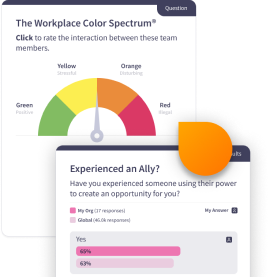
Recruiting Top Talent and Building Diverse Teams
Course Video Preview
A Hiring manager learns to be more inclusiveHiring managers who lack an understanding of proper interviewing and hiring practices may overlook exceptional candidates, compromising your organization's mission, values, diversity initiatives, and workplace performance. Additionally, such oversight may expose your organization to discrimination claims. In short, the individuals you hire shape the talent and success of your team and organization as a whole.
Course DescriptionRecruiting, interviewing, evaluating candidates, and onboarding new employees takes skill and practice to do it effectively, inclusively, and respectfully.
Key Concepts- Reasons for developing hiring skills
- Writing inclusive job descriptions that don’t limit applicant pools
- Generating diverse pools of candidates
- How to write respectful, inclusive interview questions
- When to apply common evaluation criteria to all candidates
- Best practices for onboarding new candidates
Course Features
- Access to our Anonymous Ask the Expert tool
- Rich video scenarios based on real-world events
- Built-in employee sentiment surveys
- 50+ Machine Translation Options
- Optional program timer
- Policy acknowledgement tool
- Extensive customization options

Lessons
Introduction
Job Descriptions
Recruitment
Behavioral Interviewing
Do's and Don'ts
Evaluating and Onboarding Candidates
Conclusion
Provide Your Feedback
What are Hiring Restrictions?
Making a decision against hiring a candidate due to any biases such as age, race, sexual orientation, religion, physical or mental disability. Deciding whether or not to hire someone based on anything other than their capability to do the job.
Relevant Courses
Complementary Microlessons
Recommended Resources
From ‘Ask the Expert’
Emtrain’s Ask the Expert feature enables users to ask questions about compliance, bias, harassment, and diversity & inclusion as they come up. It’s all confidential, and answers are sent straight to their inbox. View some of the example questions below and see the Experts answers.

